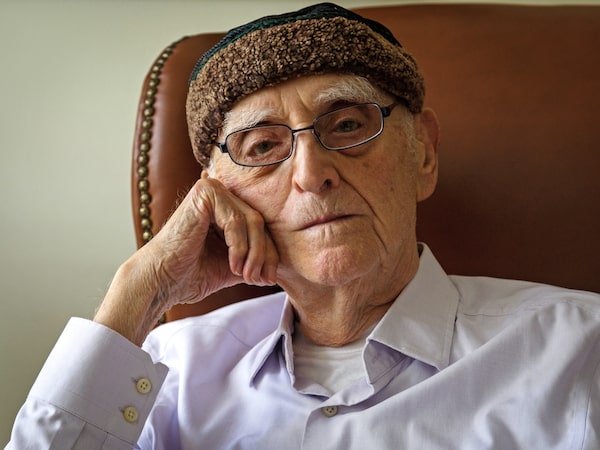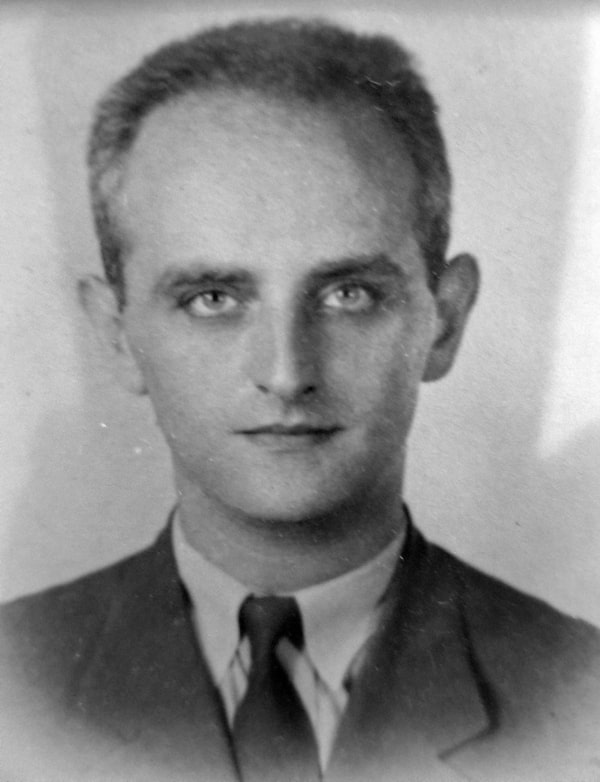
William Krehm was born in Toronto on Nov. 23, 1913.James Ireland/Handout
An early morning knock on the door of a Barcelona house inhabited by a group of international anti-fascists during the Spanish Civil War in June, 1937, began a nightmare for a young Toronto man who had come to Spain to help build a new world and instead spent months in prison before leaving Spain bitter and disillusioned.
William Krehm, who died in Toronto on April 19 at the age of 105, was a 22-year-old graduate of the University of Toronto when he arrived in Spain in the fall of 1936. He was a member of a small group of Marxists called the League for a Revolutionary Worker’s Party. They supported many of the ideas of Russian revolutionary Leon Trotsky, who had been an ally of Vladimir Lenin, but lost a power struggle to Joseph Stalin upon Lenin’s death and now lived in exile.
Crucially, Mr. Krehm and his comrades scorned Stalin and the official Communism of the Soviet Union. That made them a minority among Canadian radicals at the time.
During the Spanish Civil War, some 1,600 Canadians fought on the side of the Spanish government against a rebellion led by Francisco Franco and supported by Nazi Germany and Fascist Italy. Most of the Canadian volunteers – in name, at least – were communists. They were members of the International Brigades, which had been organized by the Soviet Union’s Communist International and were led by party men.
Mr. Krehm would not have been welcomed in the brigades, but he, too, was captivated by the war in Spain. The early days were especially intoxicating. When Franco and his fellow generals launched their attempted coup, official state power dissolved in large parts of the country. The rebellion was beaten back by party and union militias and spontaneously formed groups of workers. A socialist revolution erupted alongside the fascist rebellion. Peasants seized and collectivized land. Anarchism, long suppressed in Spain, burst forth as a vital political force.
“We are not afraid of ruins,” the anarchist leader Buenaventura Durruti told a Toronto Star reporter in August, 1936. “We are going to inherit the earth. The bourgeoisie may blast and ruin their world before they leave the stage of history. But we carry a new world in our hearts.”
For Mr. Krehm, watching all this from afar, it was painful not to be there. “All the lines of all the labour songs that had been written seemed to have taken on flesh and spirit and to be marching in Spain,” he told a CBC researcher in 1965.
A conference for international leftists opposed to Soviet Communism was planned in Brussels in October, 1936, and the LRWP sent Mr. Krehm as a delegate. In September, before the conference began, Mr. Krehm travelled to Spain and briefly visited Barcelona. “It was,” he later said, “the sort of lyric, spring-like affair, where everything that a youthful and hence naive radical might have dreamed of came to pass.”
Mr. Krehm returned to Barcelona after the Brussels conference and spent most of the next eight months in the city working for the Partido Obrero de Unificacion Marxista, or POUM, a left-wing, anti-Stalinist militia and political movement. The British writer George Orwell fought with the group and later described the experience in his book Homage to Catalonia. He and Mr. Krehm would occasionally chat in Barcelona cafés.
Mr. Krehm did translation and propaganda work for POUM and wrote articles for LRWP publications back home. “Stop plastering every page of the paper with announcements of my peregrinations and supposed return,” he chided a colleague in one letter. “It’s not only embarrassing to me here, but it makes us as an excited bunch of kids endlessly thrilled that one of them has gotten to Europe.”
Mr. Krehm occasionally visited nearby front lines, but did not fight. He could not avoid the violence of the war, however. His elder son, Adam, recalls his father telling him a story about being in Madrid when German planes bombed the city, “as he described it, largely for target practice. I think he saw a lot of terrible things, and I don’t think he ever described them all entirely to us.”
Anti-fascists in Spain were a diverse and disunified bunch. As the war progressed, Spanish Communists and their allies became increasingly powerful in large part because of weapons and advisers funnelled to them by the Soviet Union. They saw POUM as a threat and plotted its destruction.

Spanish secret police called Mr. Krehm a suspected spy.Handout
That came in June, 1937, with the knock on Mr. Krehm’s door, and with similar arrests and the forcible disarmament of POUM militias elsewhere. Mr. Krehm and his fellow internationals were squeezed into a newly built basement cell with little ventilation. A tubercular Greek was soon spitting up blood. It’s unclear who arrested them. The Soviets had infiltrated the Spanish secret police, and their own agents ran a network of private prisons. Mr. Krehm said that after two weeks, he was transferred to a regular government prison, where conditions improved but were still poor. Some prisoners had oozing sores and were so starved they fought over food.
Mr. Krehm was lucky to receive better treatment. Spanish secret police documents held in the archives of the Communist International describe Mr. Krehm as a suspected spy – a dangerous conclusion. With the POUM declared illegal, its leadership was arrested. Andres Nin Perez, co-founder of the group, was tortured to death under the supervision of Soviet agents. Other foreign POUMists were sent to work camps, and at least one, Briton Bob Smillie, was allowed to die in detention.
Still, it would take nearly three months before Mr. Krehm was driven to the border and dumped in France as a free man. Back in Spain, the revolution that drew Mr. Krehm to Spain was over, as Communists steadily strengthened their control over the Spanish government. Within two years, so was the war. Franco would rule Spain for nearly 40 years.
“When we were kids growing up, it was never spoken about in our house at all,” says Adam, speaking of the Spanish Civil War. “There was a great sadness and a disillusionment on his part about how it had ended.”
Mr. Krehm, who was the last living Canadian to have volunteered in the Spanish Civil War, was born in Toronto on Nov. 23, 1913. His parents, Hyman and Sarah, immigrated separately from Czarist Russia some time between 1905 and 1910 to escape pogroms against Jews. They met and married in Toronto and began a new life in St. John’s Ward, a working-class neighbourhood home to successive waves of new immigrants.
The Krehms were not wealthy. Hyman and his brother Harry had been furriers in Russia and stuck to that trade in Toronto. Hyman and Sarah put what money they had into music lessons for their children, William and his elder sister, Ida. Ida became a pianist of international renown. Mr. Krehm would play the violin into his 90s.
Mr. Krehm met his future wife, Gladys Cowan, at Parkdale Collegiate Institute high school, where he was her tutor. Mr. Krehm was a strong student, but often absent from school. He could speak several languages fluently and passed his high-school exams despite long absences to work in New York and Chicago.
After Spain, Mr. Krehm moved to Latin America to try his luck as a foreign correspondent. He also came close to interviewing Trotsky, then living in Mexico City. According to research by lawyer and historian Tyler Wentzell, one of Trotsky’s secretaries approved the meeting and invited Mr. Krehm to the compound where Trotsky lived. But he and Mr. Krehm got into a fierce argument, and before they could patch things up a Stalinist agent assaulted Trotsky with an ice axe. He died the next day. Mr. Krehm stood guard over Trotsky’s body in the funeral home.
Mr. Krehm stayed in Latin America for eight years. Gladys joined him. They got married and had their first son, Adam, in Peru. Mr. Krehm initially struggled as a freelancer, but eventually landed a job as Time magazine’s Latin America bureau chief in 1943. He lost that job in 1947, possibly because of a book he was shopping around that was highly critical of American interventions in Latin American and the Caribbean. The family returned to Toronto in 1948.
In Canada, although he was no longer a revolutionary, Mr. Krehm found he could never really escape his past. He worked as a music critic for The Globe and Mail and the CBC, but these gigs were precarious.
“I have a very vivid recollection, I could not have been older than four, of the RCMP coming to our house and just opening the door and walking in as if they belonged,” Adam says. “They were looking into my father’s situation. And I can remember being scooped up by my mother who was in a complete panic and taken to the other end of the house. And I think shortly after my father’s job at CBC disappeared.”
Jonathan, Mr. Krehm’s second son, says his father then concluded it was pointless to work for anyone else. He started a business as a home builder and property developer. His timing was lucky, and the business made a lot of money.
“He could be very hard, but he was honest and treated people with decency,” Adam recalls. “I worked on several difficult files with him during times when people just couldn’t pay him. And he could have been much harsher and nastier with them, and he wasn’t.”
Adam says Mr. Krehm was a strict father but could have a good sense of humour. Mr. Krehm’s edges were sharper, Adam says, when he was immersed in the business: “He was a very intense, demanding, hard-driving guy at that time of his life. It was sometimes challenging being his son. But later, as he backed away from those things and became interested in economics and wrote three or four books on the subject, he mellowed and certainly in his later years was much more relaxed and tolerant of things going on around him.”
Studying and writing about economics was the focus of Mr. Krehm’s final few decades. But in his old age, he also began speaking about Spain more often. “It was very emotional for him, bringing back those memories,” Adam says.
In 2004, a doctoral student sought out Mr. Krehm after finding documents about his imprisonment among archived Spanish Civil War-era files from the Spanish secret police. Mr. Krehm frequently steered the conversation to topics other than the war but dismissed the notion that he might regret having gone to Spain in the first place. “How,” he asked, “can one regret one’s life?”
Mr. Krehm leaves his sons Adam and Jonathan, and by his grandchildren Madelaine Krehm, Emily Krehm and Rachel Krehm. He was predeceased by his wife, Gladys Krehm, his sister, Ida Krehm-Pick and his granddaughter Elizabeth Krehm.